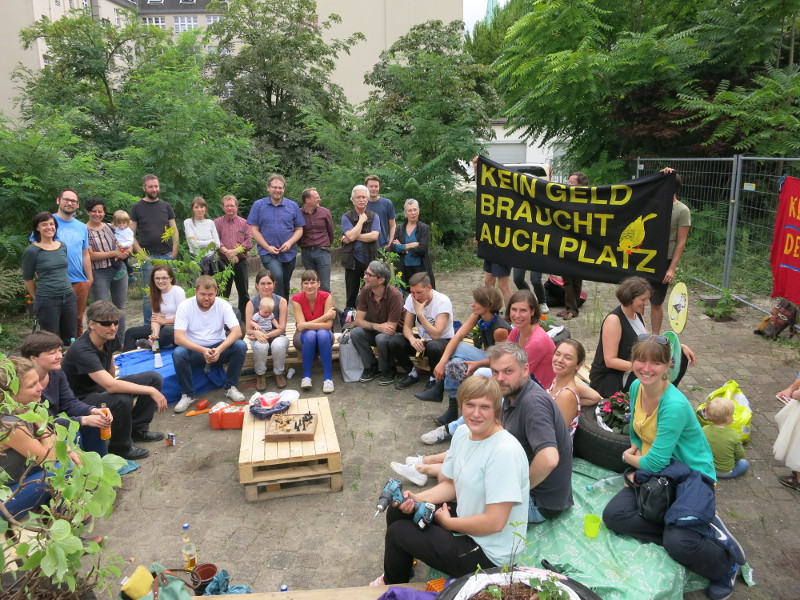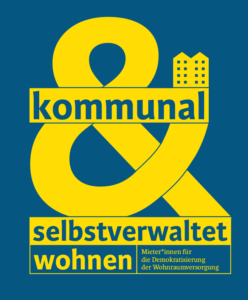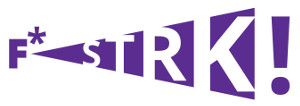- Stadt von Unten, Selbstverwaltet und Kommunal

City from Below – self-governed & communal
City from Below is an affinity-based political group made up of urban activists and neighbours who mobilise for the affordability of housing in a city that has seen a sharp rise in rent prices over the past few years.
City from Below formed in early 2014 with the objective of promoting a model project called "Self-governed & communal" (in German, the word "kommunal" means both „communal“ and „municipal“, and both meanings are intended). This model project aims to come up with new institutional arrangements that combine the democratic structures of self-governance with the wide reach of public housing – and thereby overcome the limitations of both: Making self-governance and meaningful participation in decision-making available to broader segments of tenants, beyond a middle-class-dominated, social-capital-centred self-governed housing scene and (re-)claiming public housing institutions that to this day resist calls for democratisation and, in times of neoliberalism and profit-maximising, supply mostly unaffordable municipal housing. We want the better parts of both worlds: Affordable (public) housing, but also self-governance and participation in decision-making for tenants.
The model project is based on a set of 100% asks:
- 100% rental apartments, no private ownership
- 100% real affordability (which we define as affordable for recipients of social welfare)
- 100% long term (in Germany, social housing and its affordability is usually only regulated for a limited period of time)
- 100% participation (different from cooperatives, no need to bring in private capital).
Our work focusses on a 4.7 ha area in Berlin-Kreuzberg, referred to as „Dragonerareal“. The name dates back to its 19th-century military background as a barracks area. While a number of small businesses have existed on the site for years and decades, it is one of the last inner-city sites in Berlin still to be developed for housing.
At the time we began our work in early 2014, the area was publically owned, property of the Federal government of Germany. Back in 2004, the SPD-led government at the time had opted for an austerity-driven policy of selling off all federally owned land to the highest-bidding contender. In summer 2014 the highest-bidding contest was launched to sell the property. In order to make our model project feasible at all, we had to prevent privatisation of the area. To that end we:
- engaged in a wide variety of political tactics, from advocacy work at different political levels to temporary squatting, from demonstrations to organising with the neighbours and the small business owners located on the plot (mostly small car workshops)
- thereby created a lot of media attention and public pressure on elected officials
- we took part in the bidding contest, offering one (gigantic) Euro and a social development vision for the area
- delegitimised the narrative of austerity-driven urbanism by offering a counter-narrative of the need for real affordable housing, especially in the inner city area
- delegitimised the highest bidder and exposed his organisational structure as a stock company, listed in Switzerland, his former engagement in speculative investments in the USA and Czech Republic (quite like Switzerland, a tax haven for real estate investment)
- made sure our protest was scaled up as much as possible, e.g. by with other tenant protest groups or with other issues and by linking the challenges we were facing with broader claims, such as putting an end to all privatisation of public land
A key success as well as a necessary prerequisite for our model project was the first-ever „No!“ by the majority of Finance Ministers meeting in the Federal Council, rejecting the sell-off of public property in the case of the Dragonerareal in 2015. This vote opposed the decision of Federal Minister of Finance, Wolfgang Schäuble, to privatise the site. It took until end of 2016 for the Ministry of Finance and the administration to finally accept this vote and offer the land to the state of Berlin (Berlin is one of the 16 states of Germany, its districts are municipalities). The Dragonerareal was transferred to the city of Berlin at the end of 2018.
Fighting successfully to prevent the privatisation of the Dragonerareal site has laid the groundwork for our model project. The city of Berlin has a strong interest in creating housing space, but not (yet) in alignment with our claims. It is evident that we do not need just any sort of new build, but housing that is actually fully affordable – 100% - to even begin putting a brake on gentrification, displacement of tenants and small business, and rent prices spiralling out of control.
To further promote the model project and our demands, Stadt von Unten activities include:
- working to delegitimise the discourse of "social mixing", which is frequently used to invalidate calls for 100% affordable housing,
- physically and symbolically using and appropriating the site for reunions and gatherings, festivals, urban gardening…
- engaging in a planning process from below and in opposition to the official participatory process
- running „Plangarage“ (borrowing from Hamburg‘s Planbude) – a workshop/event venue in one of the garages on the site to hold meetings and events, organise with the neighbourhood and groups that are interested in taking part in the model project
- organising a collective learning process on the political set-up and the institutional arrangement of the model project
City from Below is part of the wider tenant and Right to the City movement in Berlin and of a global movement against neoliberal and austerity-driven urbanism.
Selbstverwaltet und Kommunal
Her mit dem Berliner Modellprojekt in Kreuzberg61 auf dem sogenannten Dragonerareal. Wir wollen dort:
100% Mieten
keine Eigentumswohnungen und Eigentumsprojekte
100% Teilhabe
ohne Eigenkapital, Einlage oder Anteilszeichnung
100% wirklich soziale Mieten
Mieten, die auch für Menschen, die Sozialleistungen beziehen, tragbar sind
100% dauerhaft abgesichert
Privatisierungen werden ausgeschlossen
Nach mehr als 8 Jahren Organisierung, Aktionen, einigen Erfolgen und auch ein paar Rückschlägen, aber mit großen Hoffnungen auf zukünftige Kämpfe sagt Stadt von Unten: Tschüss, es war schön mit Euch!
https://stadtvonunten.de/tschuess-auf-in-die-stadt-von-unten
#KleinodVorDemUmbruch
#Dokumentarfilm über das #Kreuzberg|er #Dragonerareal
Einmalig am 28.7.2022 um 18 Uhr @Yorck_Kinos / Yorck!
Wir freuen uns auf Euch!
Da wir sehr unbekannt sind, freuen wir uns über eure zahlreichen RTs: @stadtvonunten @dwenteignen @TspLeute @rathausblock
@stadtvonunten Unser Low-Budget-Dokumentarfilm über das #Dragonerareal zeigt u.a. die Geschichte und den Kampf gegen die Investoren:
#KleinodVorDemUmbruch👇
Heute: 19:30 Sputnik-Kino
28.07. 18 Uhr Yorck-Kino
27.08. Freiluftkino Hasenheide
04.09. Dragonale @rathausblock
https://twitter.com/kleinod_xberg/status/1549048563820527616?s=20&t=Uyoa0qQxbZ4PCtknvCY3rw
Ach ja, wir sind übrigens morgen 19.07.22 um 19:30 Uhr im @Sputnik_Kino zur Sondervorstellung von unserem #Dokumentarfilm #KleinodVorDemUmbruch über das #Dragonerareal - mit anschließendem Filmgespräch in der Kinobar!
#Berlin #Kreuzberg #xberg #Kreuzberg61
#Geschichte #Städtebau https://twitter.com/cora_vb/status/1547988163661950978
Dass auf dem #Dragonerareal in einem Modellprojekt mehr als 50% Sozialwohnungen entstehen, das Gewerbe bleiben darf und die Zivilgesellschaft wirklich mitbestimmt, wäre ohne den jahrelangen Kampf vieler Initiativen nicht möglich gewesen. Gehört zur Geschichte dazu.
Dragoner-Areal: Erste Abrissarbeiten für das neue Stadtquartier https://www.berliner-zeitung.de/mensch-metropole/berlin-kreuzberg-dragoner-areal-erste-abrissarbeiten-fuer-das-neue-stadtquartier-li.247944 @berlinerzeitung






